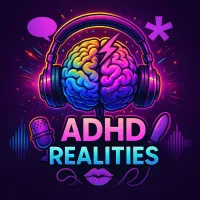Episode Description
What if your “rotting brain” isn’t rotting at all — it’s regulating?
In this fiery, science meets sarcasm episode, Dr. Leann Borneman breaks down the viral panic around rot culture and doomscrolling — and explains why most of the research behind it was never designed for ADHD brains in the first place.
We’ll talk about:
-
Why scrolling funny, happy, or comfort content isn’t “doomscrolling” (and why everyone’s using that term wrong)
-
How weak neurotypical studies turned into moral panic headlines about “screen addiction”
-
The ADHD paradox of being overstimulated and bored at the same damn time
-
Why shame — not screens — is what’s frying our nervous systems
-
And how to figure out whether your scrolling is regulation or avoidance
With humor, science, and a few well-placed f-bombs, Dr. Borneman flips the conversation on overstimulation and teaches you how to decode your own dopamine, not demonize it.
💥 Maybe the problem isn’t screens — maybe it’s our refusal to see nuance.
🎧 Listen now.
Resources:
Executive Function 101 Ebook
References:
Fabio, R. A., & Suriano, R. (2024). The Role of Smartphone Use in Sensory Processing: Differences Between Adolescents with ADHD and Typical Development. International Journal of Environmental Research and Public Health, 21(12), 1705. https://doi.org/10.3390/ijerph21121705
Ferreira, Julia & Silva, Roberta & Hamuche, Carolina & Nascimento, Rafael & Ribeiro, Ana & Gil, Saulo & Melo Neves, Lucas. (2025). Positive ADHD Scores are Associated With Higher Screen Time and Anxiety Symptoms in Medical Students: Cross-sectional Study. Actas espanolas de psiquiatria. 53. 494-503. 10.62641/aep.v53i3.1892.
Meng Z, Ao B, Wang W, Niu T, Chen Y, Ma X, Huang Y. Relationships between screen time and childhood attention deficit hyperactivity disorder: a Mendelian randomization study. Front Psychiatry. 2024 Sep 23;15:1441191. doi: 10.3389/fpsyt.2024.1441191. PMID: 39376970; PMCID: PMC11457377.
Przybylski AK, Weinstein N. Digital Screen Time Limits and Young Children's Psychological Well-Being: Evidence From a Population-Based Study. Child Dev. 2019 Jan;90(1):e56-e65. doi: 10.1111/cdev.13007. Epub 2017 Dec 13. PMID: 29235663.
Shabahang, Reza & Hwang, Hyeyeon & Thomas, Emma & Aruguete, Mara & McCutcheon, Lynn & Gábor, Orosz & Hossienkhanzadeh, Abbas Ali & Mokhtari Chirani, Benyamin & Zsila, Ágnes. (2024). Doomscrolling Evokes Existential Anxiety and Fosters Pessimism about Human Nature? Evidence from Iran and the United States. Computers in Human Behavior Reports. 15. 100438. 10.1016/j.chbr.2024.100438.
